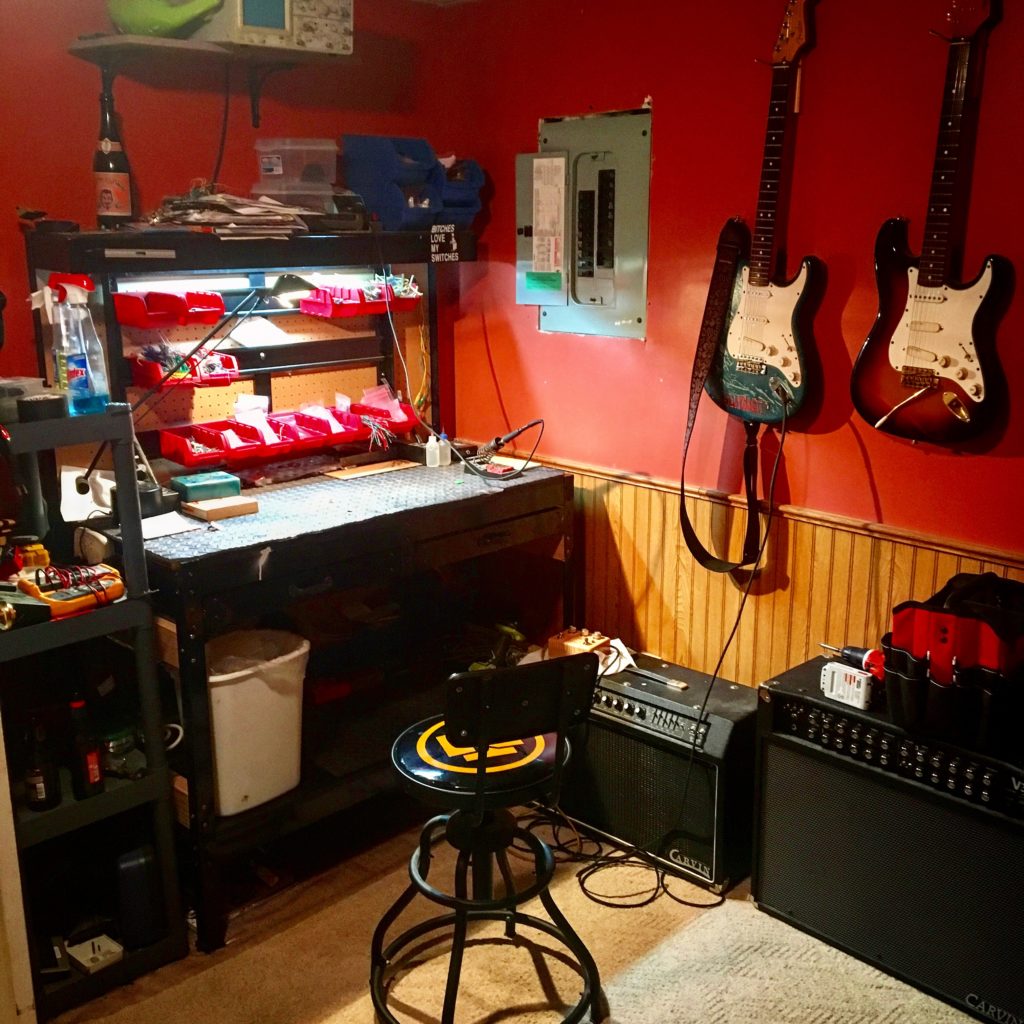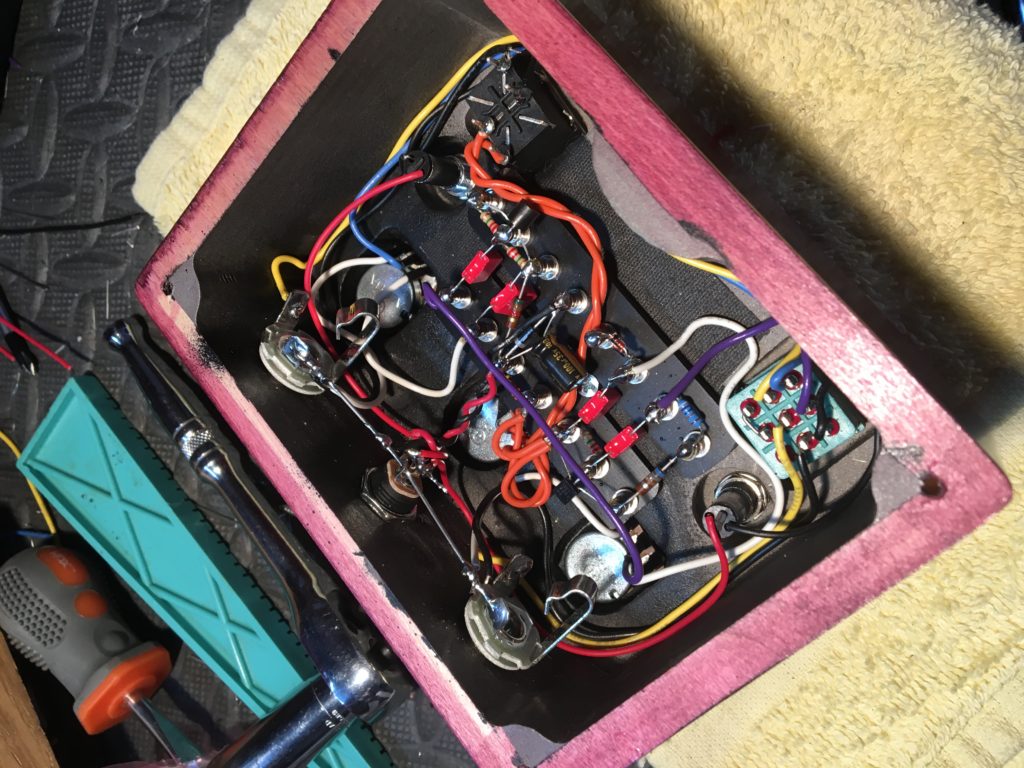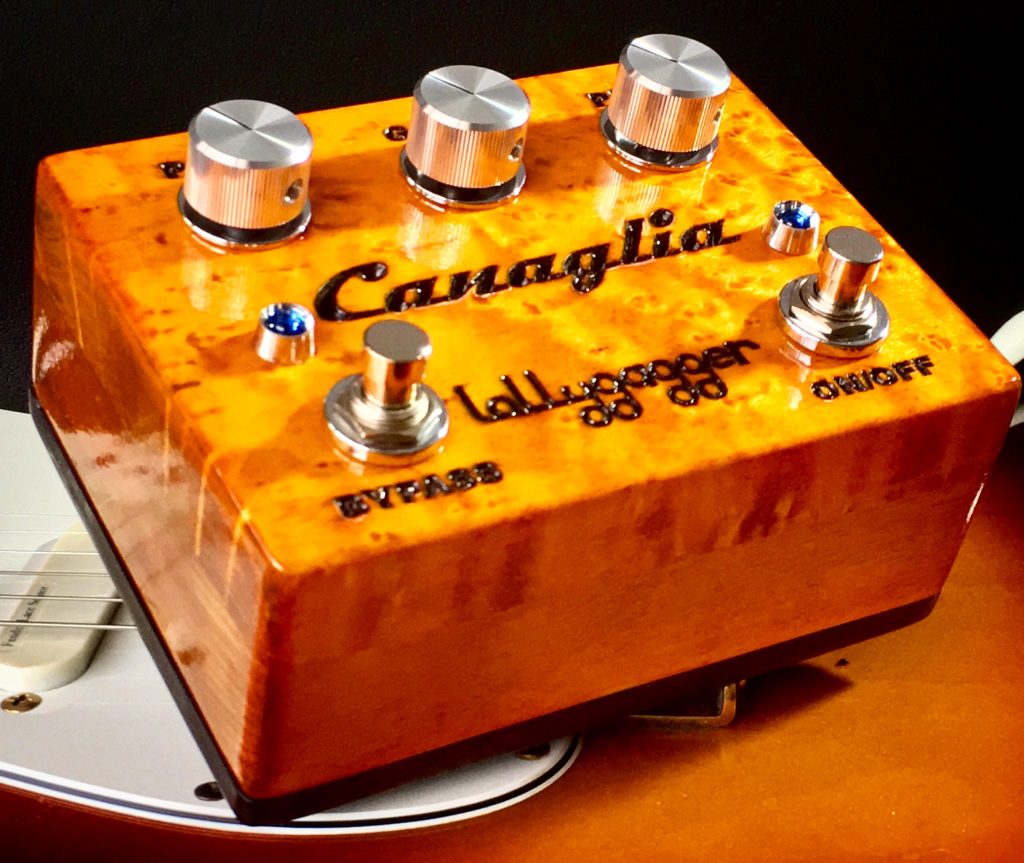Sean Wright
Traverse City, Michigan
Co-owner of Lollygagger FX
www.lollygaggerfx.com
info@lollygaggerfx.com
How long have you been a musician? How did you get into it in the first place?
I first started out as a frustrated drummer who would keep time like a broken clock….at least twice during the song I’d be in time. I think I was 16 when I started playing an instrument. A year later we moved into an apartment and that was the end of my awkward brief career as a drummer. My younger brother played guitar so I started playing his. And I haven’t stopped playing guitar in 30 years.
Who have been some of your major musical influences, past or present?
My influences were Gary Moore, George Lynch, Page, Hendrix and Blackmore. And of course I don’t sound like any of them.
What led to the start of Lollygagger FX? How long have you been in business?
After I graduated college I spent almost ten years doing some form of repair tech work focusing on music equipment. After a while I got burnt out and went into industrial electronics focusing on torque measuring equipment. I have been in industrial electronics for fifteen years now. During that time I would still repair friends’ equipment and build circuits for myself. I originally wanted to start out building my own brand of tube amps. Anyone in the business knows it takes a lot to break into the amp industry. Then six years ago I thought that I might be able to start out smaller by building effects pedals. I had an idea for a circuit and soon after our Cherry Box fuzz came out. We began selling them just through social media and word of mouth. Then a year later the Canaglia Overdrive came out and like so many others stories I started making them and people bought them. After about a year of this I realized I was a business, a small one, but still a business.
Lollygagger Fx has been in business for six years, the last three being actually being a business, and not a hobby like it was in the beginning. Right now Lollygagger Fx consists of myself and my wife Colette. Colette manages the accounting and marketing business side of things. We both do the finish work and I do all of the electronics and testing. Even though we are a small business, we could not have done it without the input, thoughts and ideas of so many others. We have so many people who we have access to that are willing to share with us what they know. One of the aspects of Lollygagger Fx that we pride on is that we are a small local Michigan business. Most of our suppliers are in Michigan and we named our first pedal after our hometown. The CherryBox is named for Traverse City, MI, which is the Cherry Capital of the World.
Did you have formal schooling, or are you self-taught? Take us through that story:
I actually got my secondary education in EMT (electronic music technology). It was an associates program, at the time, through Red Wing Technical College in Red Wing, Minnesota. The first year was standard electronics education and the second year was all analog and digital
theory that was focused on music gear circuits. My specialty was analog circuits specifically tube circuits and transistor circuits.
What drives you as far as new pedal creation is concerned? How long does it typically take for an idea to come full circle and become a demo pedal? What’s the process behind new gear, and the eventual release of it to the public?
What drives me as a builder is looking for needs that are not being met in the industry today and a lot of the time players might not even know they had a need in the first place. My job is to present them with the tool to meet their need. For me personally I love quirky and weird sounds. I like seeing non conventional things being used in a very conventional way. That was the main antithesis of the Cherry Box. I wanted a pedal that would push the front end of a dirty amplifier into weird fuzz and compression sounds and although the Canaglia is a standard (yet still unique) Overdrive and its esthetic’s were the focus of our unconventional theme by using our CNC wooden enclosures. We decided to look into wooden enclosures as merely a fun thought experiment. But the more time we put into this funny idea the more I thought of it as viable. The possibilities for originality and customization from that point became endless. We could use any number of hard woods and finishes and we could do a customer pedal in a quick turnaround.
What are some of the biggest concerns facing your profession today?
Some of my concerns are basically about what constitutes (made by hand) (artisan) (boutique). I started out building as a hobby and I think, like many others, these are the golden years of gear and more specifically effects pedals. But there is clearly a difference between someone selling their hobby and someone selling a product. With the explosion of new builders the player now has to wade through a sea of people that are building at (their) spec and those who build toward an industry spec. You could have built the single greatest fuzz ever but if it falls apart because you just started learning how to solder yesterday it won’t matter how good it is! Then because of experiences some customers have had with poor build quality we as an industry are burdened with the stigma of the few. A couple bad experiences with quality and people will write off the small builder as a whole. That is what worries me.
Where do you see pedal building going in the future?
I think pedals in the future will go more and more into DSP. That’s not to say there won’t be people like me doing this but as hardware becomes easier to interface and program I see kids and teenagers getting into it. I think that’s great because that will mean my skill set becomes more valuable and if I continue building products with great quality everything else will work it’s self out.
Who are some of your favorite builders in the industry right now?
There are so many incredble builders out there right now. If I’m doing a tier type round up I’d start with the Goliaths:
– Robert Keeley is the poster boy of tenaciousness but with a smile and chuckle. I won’t go over the last couple of years he’s had but suffice it to say if you could go through all of that and build your business bigger than it was? YET become even more humble than you already were??? You sir would be a better person than I.
– Mr. Vex he’s the guy who got me thinking about the outside of the box (pun intended) he’s the guy who said “oh wait? You want to control all of the possible variables in a fuzz circuit?! …. I can do that!”
– Paul Cochrane is one of the hardest working guys in the business and he still single handily builds his pedals. He came up with a great design and went meat and potatoes with it. Nothing too fancy just hands on work and practical and powerful pedals. I love the Tim!
Middle tier and down
– Dwarfcraft is still my go to place if I want (as in buy) or get inspiration for anything weird and cool!
– Tom at Tomkat is making beautiful stuff; I love his PCB’s and layouts.
– Leon at Pelican NoiseWorks came out with the best fuzz pedal of 2016… If you love fuzz, his Pelitaur is a must!!
Name the last 5 records you listened to:
I normally listen to podcasts and audio books mostly but recently have been in a shoe gaze kick so it’s been Lush’s Gala album, MBV’s Loveless and a lot of Swervedriver.
The Klon hype: Love it or Hate it?
Hmmmm…. not every mouse attempts to take the cheese from the trap and yet they go on to live another day.
Thanks so much to Sean for taking the time to answer some questions! Make sure to go check out lollygaggerfx.com to peruse all of their gear – Cheers!
GET EXCLUSIVE UPDATES, CONTEST INFO, SEE OUR LATEST DEMO VIDEOS AND MORE:




















